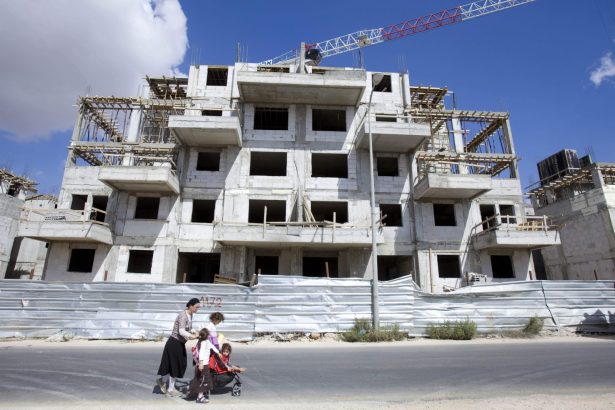Think you know who the settlers are? Think again
I live beyond the Green Line. That makes me a settler. Knowing nothing more about me than where I reside, many would conclude, without further ado, that I am an obstacle to peace. The word ‘settler’ has terrible connotations. It immediately conjures images of machine gun wielding religious fanatics, hell bent on territorial conquest irrespective of the cost; racist, and willing to put their children in mortal danger to actualise their dream of Greater Israel.
I, however, am none of those things. I own no gun. I shirk religious fanaticism. I am in favour of profound territorial compromise. I believe in national self-determination for both the Jewish and the Palestinian people. I’m not racist. And my children’s safety is much dearer to me than my political ideology.
I am no strange statistical anomaly. Actually, I’m no less representative of the Jewish population beyond the Green Line than those gun-toting lawless religious fanatics that make the headlines.
It’s time we realise that the Jewish demographic beyond the Green Line is far more varied than people think. Gilo, the secular suburb of Jerusalem, boasts a population of at least 40,000. Add to this the secular settlements of Ma’aleh Adumim, numbering 40,000, and Ariel, numbering close to 18,000. And let’s not forget about the ultra-Orthodox, and therefore generally non-Zionistic settlers who live beyond the Green Line: approximately 20,000 in Ramat Shlomo, more than 35,000 in the city of Beitar, and almost 50,000 more in Kiryat Sefer. Then add to this figure the thousands of mainly moderate Modern Orthodox residents of Gush Etzion. That’s considerably more than half of the Jewish presence, estimated to be 350,000, beyond the Green Line. And not one of them fits the bill of the gun toting Religious Nationalist stereotype.
Sure, you can find hilltop settlements full of the most reactionary Jews in Israel. But they’re not just a minority of Israelis. They’re even a minority of the settlers! As a settler, or at least as a person living beyond the Green Line, I condemn them and condemn the government’s tacit support for their existence. How can it be that these illegal outposts – illegal even under Israeli law – get the full complement of Israeli utilities and army security? But, as I say, those people are the minority.
I live in an area south of Jerusalem called Gush Etzion. I live there because it is the heartland of the sort of Orthodox Judaism I want to grow in; totally open to the non-Jewish and non-religious world, to non-Jewish wisdom, and to social justice: liberal-minded towards the role of women in Judaism and compassionate, non-judgemental and understanding, rather than bigoted in its treatment of homosexuals. Gush Etzion hosts a yeshiva, Yeshivat Hamivtar, in the town of Efrat that allowed me to study in just that sort of open Orthodox environment. And now I’m lucky enough to be learning at Yeshivat HarEtzion in Alon Shvut, one of the premier centres of Torah scholarship in the world.
Yes, my left-leaning political views place me in a minority here. But my wife and I are not politically isolated. Liberal-minded Modern-Orthodoxy is more likely to be open to liberal-minded politics than the crude fringes of the National Religious camp, or the introverted xenophobia of many ultra-Orthodox Jews. Most of my neighbours are to my political right, but my views are respected here. Indeed, the late Rav Amital, who founded my Yeshiva, was also the founder of Meimad – the only religious political party on the left-wing of Israeli politics. Where I live, he is universally revered.
‘But still,’ my detractors might argue, ‘however wonderful the community you’re living with may be, you’re living on stolen land. You’re settlement is an obstacle to peace. How can you justify that?’
Let me begin with the following observations. The Green Line is not a magic frontier such that one side is essentially Palestine and the other side is essentially Israel; it was a haphazard armistice line. In their deliberations over resolution 242, the UN Security Council explicitly recognised that the Green Line would make a terrible final border – leaving towns divided and leaving Israel especially vulnerable to certain types of attack. Lord Caradon, who helped to negotiate Resolution 242, told the Beirut Daily Star (12 June 1974) that ‘It would have been wrong to demand that Israel return to its positions of June 4th, 1967 [the Green Line], because those positions were undesirable and artificial. After all, they were just the places where the soldiers of each side happened to be on the day the fighting stopped in 1948. They were just armistice lines. That’s why we didn’t demand that the Israelis return to them, and I think we were right not to…’
Jews owned land on both sides of the Green Line pre-1948. Some of the current settlements, like the area I live in, used to be owned by Jews and were resettled by the orphans of the massacres that took place at the hands of Arab forces in the War of Independence. Had the wind been blowing in a different direction, perhaps the fighting would have ceased along a slightly different line. The Green Line is pragmatically relevant for starting negotiations, but it is not sacrosanct.
Let me add a controversial point for a Zionist to make: Palestinian national consciousness has a claim to the entire land of Mandate Palestine. They view themselves as the indigenous people of the entire land. A two-state solution is, for them, a bitter pill to swallow. But, Jewish national consciousness also has a claim to the entire land of Mandate Palestine, from the hills of Hebron, where Abraham and his descendants buried their dead, to the fertile crescent of the Mediterranean. Before 1948, both communities owned land on both sides of the Green Line. To give up a single inch is a painful concession for a Jew, just as it is for a Palestinian who understands his or her history. We both have a claim to the entire land, but we can’t both have it all. So, what shall we do?
The Palestinians are going to pay for the mistakes of their political leaders, just as people do everywhere. Had the Arab leadership accepted the partition plan in 1947, they would have been able to claim more of Mandate Palestine than they can now conceivably be offered. Had the Arab world not tried to obliterate Israel in 1967, they might have been able to claim the Green Line as their border before any settlements were built.
And we Israelis are going to have to pay for the mistakes of our leaders, who have allowed and even encouraged us to build settlements in places that cannot be maintained if the Palestinians are ever going to have a contiguous state of their own. Those settlements will have to be pulled down. People will be uprooted. It will be traumatic. But that is the price that we will pay for bad leadership.
Having said that, we’re not going to return to the Green Line as our border. Even the Obama formula – 1967 borders with mutually agreed land swaps – recognises that the Green Line will not be the last word. Yes, some of the settlements, especially the illegal outposts, are there just to provoke the Palestinians and to make their statehood impossible. Yes, a disturbing number of settlers are messianic ideologues fuelled by zealotry and racism. But, most of the settlers are not. Most are not there to stop the Palestinians from building their own state. And most of their developments could easily be swallowed up by the Israeli border if we were to make land swaps with the Palestinians.
Many of us would vote for left-wing parties and move away at the first sign that a sustainable two-state solution was imminent and required us to move. But peace does not require most of us to move. Why uproot hundreds of thousands of settlers if they’re not terrible xenophobic Palestinian-haters who somehow deserve to be punished, and if peace can be achieved via land swaps and compromises that won’t force the huge economic and psychological upheaval of thousands of evictions? As I said, some of the settlements will have to go (especially the most radical of them), but most of them can probably remain on the basis of mutually agreed land swaps. In the meantime, settlement expansion should, in my opinion, cease, so as not to prejudice negotiations any further by the creation of more ‘facts on the ground.’
The sooner people realise that there are all sorts of people living beyond the Green Line, for all sorts of reasons, and that the majority of us don’t fit people’s stereotype of a ‘settler,’ the sooner there will be a more civilised and fruitful discussion about the future of the settlements.






































Comments are closed.